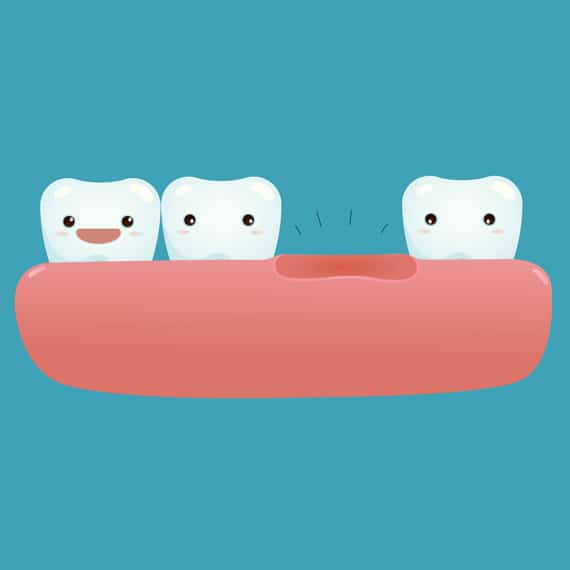
Replacement options for missing teeth
A missing tooth can be caused by gum disease, dental decay, accident, or genetic disease. The underlying reason is that missing teeth can make regular eating and speaking unpleasantly. There are, however, several options available if you want to replace a missing tooth or repair a broken tooth. These replacement choices may help you restore function while also improving the look of your mouth. Each option has advantages and disadvantages that your dentist may help you evaluate, depending on your unique circumstances.
Our dentists at Bellevue Azalea Dentistry can help you choose the appropriate option for your missing teeth. Keep reading to discover more about the choices accessible to patients, as well as the benefits of each treatment.
3 options for replacing a missing tooth
There may be minimal or no impact of missing teeth in some situations. You may not even sense a void in your mouth. However, this depends on the position of the lost tooth. This might be the situation if you have a tooth missing in the rear or side of your mouth. But because your teeth are built to operate together, losing one or more teeth may interfere with speaking, eating and trigger other issues over time.
Here are some choices for replacing lost teeth and the benefits and drawbacks of each:
1. Dental Implant
Dental implants are an appropriate option when a single tooth has to be replaced. They are especially beneficial if you have numerous lost teeth in different areas. This procedure entails surgically implanting a titanium metal post or frame into the jaw. A replacement tooth is then attached to the implant, allowing the tooth to stay in place. Once a dental implant has fused into the jaw bone, the longevity percentage after 15 years can reach more than 90%, depending on:
- a regular and proper cleaning procedure,
- constant monitoring, and
- professional maintenance.
Advantages of dental implants
- The replacement tooth looks and feels like a natural tooth and may last for decades
- An implant does not affect surrounding teeth
Disadvantages of dental implants
The recovery process might take months. Your dentist will not connect the new tooth until the dental implant has healed fully. Furthermore, dental implants are more expensive than other tooth-replacement choices.
2. Dental Bridge
If you don’t want a dental implant, ask your dentist if you can get a dental bridge instead. If you miss one or more teeth in the same region, this tooth replacement approach may benefit you. Your dentist may prescribe the following types of dental bridges:
Traditional dental bridge
A traditional dental bridge comprises an artificial tooth or teeth that are kept intact by dental crowns bonded onto each abutment tooth. A traditional dental bridge can be recommended when you have natural teeth on both sides of the gap left by the missing tooth.
Resin-retained dental bridge
A resin-retained dental bridge, also known as a Maryland dental bridge, is comparable to a traditional bridge. It may only be utilized if you have a natural tooth on either side of the lost tooth gap.
Cantilever bridge
A cantilever dental bridge is comparable to a traditional bridge. The pontic is kept intact by a dental crown glued to only one abutment tooth. A cantilever bridge requires only one natural tooth beside the lost tooth gap.
Advantages of dental bridges
- Bridges are desirable because they feel and appear like natural teeth
- They may enhance the look of your natural teeth on either side of the gap
- They are also more affordable than dental implants
Disadvantages of dental bridges
- Cleaning around the tooth beneath the bridge might be challenging
- A poorly placed bridge may gradually harm adjacent teeth over time
3. Dentures
If you need to replace all dentition, your dentist may recommend complete dentures. These false teeth are bonded to a plate placed against your gums.
Removable partial dentures
However, if you need to replace a few teeth, you might benefit from a removable partial denture. If you also need to replace multiple teeth in one area of your mouth, these dentures may also be an appropriate choice.
Advantages of partial dentures
Removable partial dentures are more affordable and easier to fix and replace than other tooth replacement solutions.
Disadvantages of partial dentures
- Some patients may find wearing partial dentures unpleasant at first
- Dentures need to be removed and cleaned regularly, and they need to be removed before going to bed
- They may become more vulnerable to harm as a result of repeated handling
Conclusion
Having one or more missing teeth may significantly impact a patient’s dental health and overall lifestyle. Patients may carefully explore each of these tooth replacement options with their dentists. The cost will vary based on the type of replacement, the number of teeth to be replaced, and even where you live. These treatment methods are effective, and with proper cleaning and care, a dental implant, bridge, or partial denture may last for a long time.
Frequently Asked Questions
What Is The Cheapest Way To Replace Missing Teeth?
Dentures are the cheapest tooth replacement option. This is because they require very little time to assemble. There is also no need for surgery or dental crowns.
Are Implants Better Than Dentures?
Since dental implants are easier to maintain than dentures, they result in fewer visits to the dentist. Furthermore, they are more convenient and appear more natural than dentures.
Can I Get Veneers If I Have Missing Teeth?
No. Veneers can’t be used to repair lost teeth. There has to be a tooth present to have a dental veneer installed.

